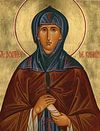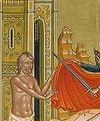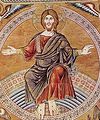

| Previous day | Next day |
| Old Style
February 6
|
Sunday |
New Style
February 19
|
|
Meat-fare Sunday.
Tone 2.
Заговенье на мясо. |
No fast.
|
![]() St. Bucolus, bishop of Smyrna (ca. 100).
St. Bucolus, bishop of Smyrna (ca. 100).
Virgin-martyr Dorothea, and with her Martyrs Christina and Callista, sisters, and Theophilus, at Caesarea in Cappadocia (288-300). Virgin-martyr Fausta, and with her Martyrs Evilasius and Maximus, at Cyzicus (305-311). Martyr Julian of Emesa (312). Sts. Barsanuphius the Great and John the Prophet, monks of Gaza (6th c.). St. Photius, patriarch of Constantinople (891). Virgin-martyrs Martha and Mary and their brother Lycarion at Tanis (Hermopolis) in Egypt. St. Dorothea, schemanun, of Kashin (1629).
New Hieromartyr Basil Nadezhnin, priest, of Moscow (1930).
St. James, ascetic, of Syria (ca. 460). St. Mael, bishop of Ardagh (488), disciple of St. Patrick. St. Vedast, bishop of Arras (540). St. John of Thebes, monk of Palestine (6th c.) St. Amand, apostle of Maastricht (675). St. Arsenius of Iqalto, Georgia (1127).
Repose of Archbishop Theophan (Bystrov) of Poltava (1940).
Thoughts for Each Day of the Year
According to the Daily Church Readings from the Word of God
By St. Theophan the Recluse

Meat-fare Sunday (35th). [I Cor. 8:8–9:2; Matt. 25:31–46]
The great judgement! The judge cometh in the clouds, surrounded by a countless multitude of bodiless heavenly powers. Trumpets sound over all the ends of the earth and raise up the dead. The risen regiments pour into the determined place, to the throne of the Judge, having already a foreboding of what verdict will sound in their ears, for everyone’s deeds will be written on the brow of their nature, and their very appearance will correspond to their deeds and morals. The division of those on His right hand and those on His left will be accomplished in and of itself.
At last all has been determined. Deep silence falls. In another instant, the decisive verdict of the Judge is heard: to some, “Come,” to the others, “depart.” “Have mercy on us, O Lord, have mercy on us! May Thy mercy, O Lord, be on us!” they shall say, but then it will already be too late to plead. We need to take the trouble now to wash away the unfavourable marks written upon our nature. Then, at the judgment, we would be ready to pour out rivers of tears in order to wash ourselves; but this would do no good. Let us weep now, if not rivers of tears, then at least streams; if not streams, then at least drops. If we cannot find even this much, then let us become contrite in heart, and confess our sins to the Lord, begging Him to forgive them, and promising not to offend Him any more through violation of His commandments. Then, let us be zealous to faithfully fulfil this promise.
Articles
 St. Bucolus the Bishop of SmyrnaSaint Bucolus, Bishop of Smyrna, was a disciple of the holy Apostle and Evangelist John the Theologian, and became the first Bishop of Smyrna (Asia Minor). |
 Virginmarty Fausta at CyzicusThe girl bravely confessed her faith and was subjected to many cruel tortures. |
 Martyr Evilasius at CyzicusSaint Evilasius was an eighty-year-old pagan priest who was ordered to turn Saint Fausta away from Christ. |
 Martyr Maximus at CyzicusThe eparch Maximus was sent to investigate the case of Saints Fausta and Evilasius for the emperor, and he began to torture the old man who had come to believe in Christ. |
 Martyr Julian of EmesaHe was a skilled physician, and healed illnesses not only of the body but also of the soul, and he converted many people to faith in Christ the Savior. |
 Venerable John the ProphetSaint John, a disciple of Saint Barsanuphius, lived in a cell outside the monastery of Abba Seridus for eighteen years until his death. |
 St. Arsenius of Iqalto in GeorgiaSaint Arsen of Iqalto was a translator, researcher, compiler of manuscripts, hymnographer, philosopher, and a great defender of the Georgian Christian Faith. |











